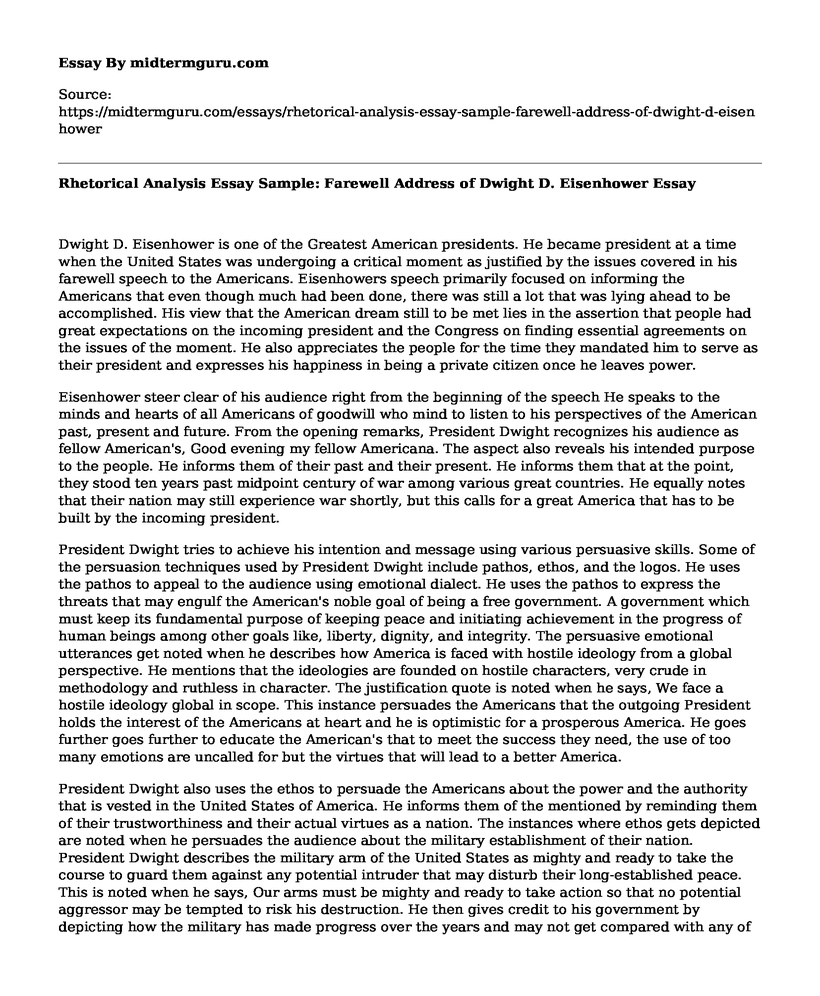Dwight D. Eisenhower is one of the Greatest American presidents. He became president at a time when the United States was undergoing a critical moment as justified by the issues covered in his farewell speech to the Americans. Eisenhowers speech primarily focused on informing the Americans that even though much had been done, there was still a lot that was lying ahead to be accomplished. His view that the American dream still to be met lies in the assertion that people had great expectations on the incoming president and the Congress on finding essential agreements on the issues of the moment. He also appreciates the people for the time they mandated him to serve as their president and expresses his happiness in being a private citizen once he leaves power.
Eisenhower steer clear of his audience right from the beginning of the speech He speaks to the minds and hearts of all Americans of goodwill who mind to listen to his perspectives of the American past, present and future. From the opening remarks, President Dwight recognizes his audience as fellow American's, Good evening my fellow Americana. The aspect also reveals his intended purpose to the people. He informs them of their past and their present. He informs them that at the point, they stood ten years past midpoint century of war among various great countries. He equally notes that their nation may still experience war shortly, but this calls for a great America that has to be built by the incoming president.
President Dwight tries to achieve his intention and message using various persuasive skills. Some of the persuasion techniques used by President Dwight include pathos, ethos, and the logos. He uses the pathos to appeal to the audience using emotional dialect. He uses the pathos to express the threats that may engulf the American's noble goal of being a free government. A government which must keep its fundamental purpose of keeping peace and initiating achievement in the progress of human beings among other goals like, liberty, dignity, and integrity. The persuasive emotional utterances get noted when he describes how America is faced with hostile ideology from a global perspective. He mentions that the ideologies are founded on hostile characters, very crude in methodology and ruthless in character. The justification quote is noted when he says, We face a hostile ideology global in scope. This instance persuades the Americans that the outgoing President holds the interest of the Americans at heart and he is optimistic for a prosperous America. He goes further goes further to educate the American's that to meet the success they need, the use of too many emotions are uncalled for but the virtues that will lead to a better America.
President Dwight also uses the ethos to persuade the Americans about the power and the authority that is vested in the United States of America. He informs them of the mentioned by reminding them of their trustworthiness and their actual virtues as a nation. The instances where ethos gets depicted are noted when he persuades the audience about the military establishment of their nation. President Dwight describes the military arm of the United States as mighty and ready to take the course to guard them against any potential intruder that may disturb their long-established peace. This is noted when he says, Our arms must be mighty and ready to take action so that no potential aggressor may be tempted to risk his destruction. He then gives credit to his government by depicting how the military has made progress over the years and may not get compared with any of his predecessors. He goes further to inform them of the strong military establishment that their country has gone through, the economic and political prosperity that their nation bears, and all is credited to their virtues.
The third persuasion technique, which President Dwight uses to persuade the Americans on the intent of his message, bases on the use of logos. He uses the technique in the better part of his speech through the presentation of various facts that his government has achieved over the years and the share of work that was awaiting the next regime. When he informs them about the military armament, the information he presents is all bounded by facts. Another factual information which he presents gets based when he mention that America will continue experiencing crises whether foreign, great or small, they will have to develop appropriate measures to curb their challenges. He finally ends by giving them hope to be strong in their faith and beliefs that America will achieve its goals. Regarding the persuasion techniques used by President Dwight, it is agreeable that he succeeded in passing his message to the Americans. He succeeded in convincing them about the progress they had made and the hope of finishing that, which was remaining.
In summary, the speech of President Dwight depicted a real leader and a true epitome of change. He used various techniques like the pathos, the ethos, and the logos to ensure that he convinced the citizens of the United States of their progress and their plans as a nation. Therefore, it is appropriate to conclude that the president succeeded in persuading the Americans of a greater nation, which is continuing to achieve more greatness.
Cite this page
Rhetorical Analysis Essay Sample: Farewell Address of Dwight D. Eisenhower. (2021, Jun 04). Retrieved from https://midtermguru.com/essays/rhetorical-analysis-essay-sample-farewell-address-of-dwight-d-eisenhower
If you are the original author of this essay and no longer wish to have it published on the midtermguru.com website, please click below to request its removal:
- American Utopia - Essay Sample
- The Separation of Church and the State - Essay Sample
- Biggest Challenges Community Policing Face - Essay Example
- Essay Sample on Abraham Lincoln And The Issue In The Civil War
- Essay Sample on Homeland Security Paradigm
- Public Goods: Freely Available and Costly Services - Essay Sample
- Public Administration Theory: Evolution and Impact - Essay Sample







